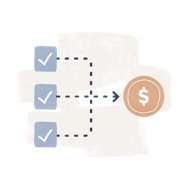Advertiser & Editorial Disclosure
You’ve been warned about mixing business and pleasure, but what about personal finances and business finances? At times, it may seem tempting to utilize your personal finances to help out when your business needs a boost, but it’s not always the best solution in the long run. Implementing a financial division between your personal and business finances can help you treat your business like the independent entity it is while safeguarding your personal finances.
Why is separating your finances so important?
Though there are many benefits to keeping your personal and business finances separate, two of the main reasons you should draw a line in the sands of finance are based on taxes and personal protection.
Taxes
Do taxes ever really seem cut and dry? If you’re in the majority, the answer is no. If you’re not, then rest assured that many of us are incredibly envious of your taxation acumen. One of the main reasons you’ll want to split your business finances from your personal finances is taxes.It is much easier to keep track of business expenses if you use a separate business account.
Once you have your shiny new business checking account, keeping track of things like expenses is essential to properly filing taxes. From office expenditures to operational and inventory purchases, every receipt counts. When it comes time to file your taxes (or hand everything over to your accountant), a thorough collection of business-only information is going to save you a lot time and a significant amount of stress.
Personal Liability
Separating your personal and business finances is important for tax reasons, but perhaps equally, if not more important is a separation of your personal finances for the sake of your personal security. Using your personal finances to back any entrepreneurial venture can be risky business, but not just because of the initial financial gamble.
Entrepreneurs often wind up signing personal guarantees for leases, loans and lines of credit. Sometimes that’s necessary–especially when your business is young and hasn’t established a strong business credit rating. But your goal should eventually be to avoid personal guarantees as much as possible. The way you do that is by building strong business credit, so lenders can be confident that your business can and will repay its debts
Tips for Separating Your Personal & Business Finances
Now that we’ve distinguished two of the more significant reasons to keep your business and personal finances separate, let’s take a look at a few of the ways that you can proactively put this division in place.
-
- Consider incorporating. incorporating your venture as a C Corp, S Corp or limited liability corporation (LLC) can provide tax benefits, but more importantly help protect your personal assets, provided you set it up properly and maintain it correctly. By maintaining a corporate structure, you can protect your personal assets from business debts, losses and lawsuits. (Keep in mind, though, that if you sign a personal guarantee, creditors can try to collect from your personal assets if you default on a debt.) If you’re serious about creating a business, incorporating is a smart first step.
-
- Open a Business Checking Account. Once you’ve made the decision to start your own business, one of the very first things you should do is head to the bank and open a business checking account. There are multiple reasons why this is a healthy step for a business. For starters, it will streamline cash flow and making record keeping much more efficient.
Additionally, a business account lends itself to easy finance tracking – something that you or your accountant will vastly appreciate come tax time. As mentioned before, a separate business account can help signify to the IRS that your venture is a business and not just a side project or hobby, making more of your expenses tax deductible.
- Open a Business Checking Account. Once you’ve made the decision to start your own business, one of the very first things you should do is head to the bank and open a business checking account. There are multiple reasons why this is a healthy step for a business. For starters, it will streamline cash flow and making record keeping much more efficient.
Small Business Checking by Bank of America
- Apply for Business Credit Card. Business credit is a big deal, and one quick and easy way to start to build it is by obtaining a business credit card. In addition to fantastic perks like building a credit history for your company, a business credit card will help you eliminate the need for personal credit cards for businesses purposes. Opening one of these cards will also help streamline business finances, and some cards reduce the risk of having your business transactions impact your personal credit. In addition, you may be able to deduct card costs (an annual fee and interest, for example), if you use it exclusively for business purchases. That may not be the case if you mix personal and business expenses on the same card.
- Set a Budget. Being armed with a business credit card and a business bank account is a terrific start, but there is another step that really can help you keep things in check – a budget. It doesn’t seem like setting a budget for your business would do a whole lot in terms of separating personal and business finances, but it can really come in handy.
Preparing (and sticking to) a budget for your business can prevent you from delving into personal finances due to poor planning. Of course, emergency situations can happen and even the best planned budgets may not always work out as intended. However, by creating a clear cut budget, you’ll be able to reduce the risk of running into avoidable costs that would otherwise leave you turning to your personal finances for rescue.
It’s not unusual for a business owner to encounter a situation that may require him or her to pull in their personal finances to fund their business dreams. While that’s not always avoidable, the tips and strategies above can help you separate your personal and business finances, safeguarding you from the potentially devastating outcome of mixing your business and personal life.
This article was originally written on November 17, 2015 and updated on November 20, 2019.




I like what you said about keeping your business and personal finances separate so that you can track expenses easily. My sister has been telling me about how she wants to start a small business in the coming months. I’ll share this information with her so that she can look into her options for getting another checking account to help with this.
https://www.fccu.org/Checking-Savings/Checking/Free-Checking
Separating your personal and business finances is important for tax reasons, but perhaps equally, if not more important is a separation of your personal finances for the sake of your personal security.
I’ve checked out a number of business credit cards and they all seem to require an EIN, which I don’t have for my business. What can I do? Does not having this affect my chances of qualifying/getting a high limit?
Chris – Have you thought about getting an EIN for your business? It’s one of the first steps we recommend for those who want to build business credit. I assume you are operating as a sole proprietor. That means it’s not required, but it is not a bad idea to get one. You will then be able to open a business bank account and get a business credit card. And you’ll be able to more effectively separate your business and personal finances. Does that help?
I got my EIN number
if I have a EIN number and I’m a small business that runs part time out of my home. My question is to qualify for a card do the pull from your personal credit or from your business and are these two separate and how does that work?
As a sole proprietor you simply use your ssn instead of the EIN for applications. A high limit to you may be different for someone else but a $10,000 limit is reasonable to expect with good personal credit.
Does it matter if my business checking account is at the same place as my personal one? Is a credit union a good option for my business account?
Hi Sydney, great questions! You business checking account can be at the same bank or credit union as your personal one, in fact it may be easier on you to keep both accounts at the same place. A credit union could be a great option for your business account—as member-owned organizations, credit unions can offer a number of advantages for individuals as well as businesses.
Keep in mind that just because a bank or credit union is a great place for a personal account doesn’t mean that what they offer is also good for business account holders—be sure to research your existing institution as well as other options to find what’s best for your business.